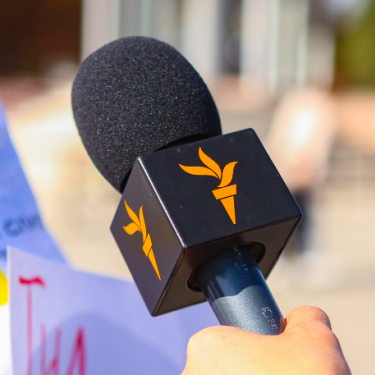RSF denounces Kyrgyzstan’s increasingly harsh censorship of Radio Azattyk

Update 7/12/23: Shortly before the European Parliament is due to debate a resolution on the repression of the media in Kyrgyzstan, the Ministry of Culture has announced the lifting of the suspension of Radio Azattyk. This decision follows the removal from its website of publications of concern to the government.
Reporters Without Borders (RSF) condemns the Kyrgyz Ministry of Culture's decision to ask a court to close the local branch of Radio Free Europe/Radio Liberty (RFE/RL), called Radio Azattyk, whose websites have been blocked since October. This would pose a major new obstacle to press freedom, which is already under growing pressure in Kyrgyzstan, says RSF, calling on the authorities to put an end to the judicial harassment of Azattyk and to stop stifling independent media.
Read in Russian / читать на русском
After months of judicial harassment, the Ministry of Culture notified RFE/RL on 23 January that it has filed a request for Azattyk’s closure with a court in the capital, Bishkek, because of a video report about clashes on the Kyrgyz/Tajik border in the Batken region in September of 2022.
The report presents the viewpoints of both parties, Kyrgyz and Tajik, but the Ministry of Culture says it violates article 23 of the Kyrgyz media law banning elements such as war propaganda and content that promotes violence and intolerance towards other peoples and nations. The court is due to examine the request on 9 February.
On the basis of Kyrgyzstan’s controversial “fake news” law, the same report was used as grounds for the 26 October decision to suspend access to Azattyk’s websites, that were then blocked for an “indefinite” period in December. RFE/RL has refused to remove the report from its Current Time TV platform because, in its view, it adheres to journalistic standards.
Meanwhile, on 26 January, a court is due to begin hearing RFE/RL’s lawsuit challenging the Ministry of Culture’s decision to block its websites, which it regards as “illegal” and “baseless” because it was not supported by any complaint about erroneous content in the video. Five days after the blocking, Azattyk’s bank account was frozen for alleged money-laundering although RFE/RL is a privately-owned broadcaster funded by the US congress. On November, 11 RFE/RL correspondents were stripped of their Kyrgyz press accreditation.
“These violations reflect a desire to establish a new hierarchy of 'truth' that puts government discourse above the law,” said Jeanne Cavelier, the head of RSF’s Eastern Europe and Central Asia desk. “The blocking of Azattyk’s websites and the judicial harassment aimed at shutting it down, echo investigative reporter Bolot Temirov’s illegal deportation to Russia. Kyrgyzstan was hitherto seen as an exception in Central Asia, one with relative press freedom, but it is now taking a worrying authoritarian turn. We condemn the step-by-step censorship of Azattyk and we call on the authorities to stop harassing independent media.”
Bolot Temirov, a journalist with Kyrgyz and Russian dual nationality who has produced a string of sensational investigative video reports about senior officials, is the most prominent victim of these authoritarian methods. After months of judicial twists and turns, he was deported to Russia on 23 November in violation of legal procedures.
Next TV director Talaaibek Duishenbiev is another victim of the government’s harassment of the media. Arrested in March 2022 for quoting a source as saying Kyrgyzstan and Tajikistan were ready to help Russia with its war in Ukraine, he was held until September, when he was given a five-year suspended prison sentence on a charge of inciting ethnic hatred and was banned from leaving the country for three years.
Aside from these cases, which have set disturbing precedents, President Sadyr Japarov’s government proposed a widely criticised new media law in September to replace the 1992 one, which legislators say needs adapting to contemporary realities. Media professionals described the proposed new law as an almost exact copy of Russia’s media law and said it was designed to get rid of news sites the government dislikes.
In response to the criticism, the authorities undertook to revise the bill with a working group of independent media representatives and then send it for review to the Council of Europe’s Venice Commission (an advisory body tasked by 61 member states with examining the compatibility of such laws with democracy, human rights and the rule of law). But the second version of the bill, which was finalised on 8 January, retains worrying articles liable to increase government control over media coverage, including one treating bloggers as media outlets and a new media registration process.
Several steps have been taken to combat the growing harassment of independent media since last year. RSF participated in the #ForKyrgyzJournalist #ForKyrgyzMedia campaign and signed an appeal by local media to President Japarov and the international community, urging them to protect the right to freedom of expression in Kyrgyzstan.
